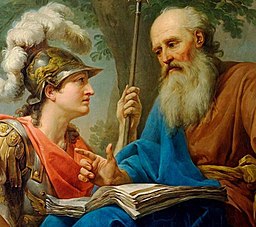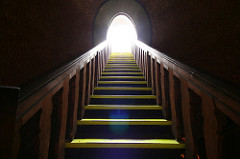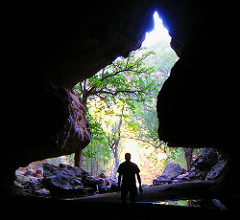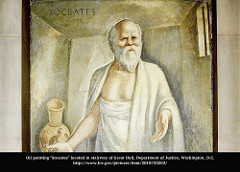6 Plato’s “Allegory of the Cave”
Jody Ondich
Plato, 428-348 BCE, was a Greek philosopher, mathematician, writer of philosophy, and the founder of the Academy in Athens. Plato was originally a student of Socrates, and was strongly influenced by his thinking. Twenty four hundred years ago, as part of one of his dialogues, “The Republic“, Plato said that life is like being chained up in a cave forced to watch shadows flitting across a stone wall. Beyond sounding a little scary as an image for living, what exactly did he mean by this?
Alex Gendler [1]unravels Plato’s Allegory of the Cave, found in Book VII of The Republic. You might find this TedEd mini-lecture helpful to listen to!
Then check the link at the end of this chapter for a modern take on this ancient and interesting allegory of The Cave!
Allegory of the Cave
 Socrates: And now, I said, let me show in a figure how far our nature is enlightened or unenlightened:
Socrates: And now, I said, let me show in a figure how far our nature is enlightened or unenlightened:
Behold! human beings living in a underground den, which has a mouth open towards the light and reaching all along the den; here they have been from their childhood, and have their legs and necks chained so that they cannot move, and can only see before them, being prevented by the chains from turning round their heads. Above and behind them a fire is blazing at a distance, and between the fire and the prisoners there is a raised way; and you will see, if you look, a low wall built along the way, like the screen which marionette players have in front of them, over which they show the puppets.
Glaucon: I see.
Socrates: The low wall, and the moving figures of which the shadows are seen on the opposite wall of the den. And do you see, I said, men passing along the wall carrying all sorts of vessels, and statues and figures of animals made of wood and stone and various materials, which appear over the wall? Some of them are talking, others silent.
Glaucon: You have shown me a strange image, and they are strange prisoners.
Socrates: Like ourselves, I replied; and they see only their own shadows, or the shadows of one another, which the fire throws on the opposite wall of the cave?
Glaucon: True, how could they see anything but the shadows if they were never allowed to move their heads?
Socrates: And of the objects which are being carried in like manner they would only see the shadows?
Glaucon: Yes.
Socrates: And if they were able to converse with one another, would they not suppose that they were naming what was actually before them
Glaucon: Very true.
Socrates: The prisoners would mistake the shadows for realities.And suppose further that the prison had an echo which came from the other side, would they not be sure to fancy when one of the passers-by spoke that the voice which they heard came from the passing shadow?
Glaucus: No question.
Socrates: To them, I said, the truth would be literally nothing but the shadows of the images.
Glaucon: That is certain.
Socrates: And now look again, and see what will naturally follow if the prisoners are released and disabused of their error. At first, when any of them is liberated and compelled suddenly to stand up and turn his neck round and walk and look towards the light, he will suffer sharp pains; the glare will distress him, and he will be unable to see the realities of which in his former state he had seen the shadows; and then conceive some one saying to him, that what he saw before was an illusion, but that now, when he is approaching nearer to being and his eye is turned towards more real existence, he has a clearer vision,—what will be his reply? And when released, they would still persist in maintaining the superior truth of the shadows.And you may further imagine that his instructor is pointing to the objects as they pass and requiring him to name them,—will he not be perplexed? Will he not fancy that the shadows which he formerly saw are truer than the objects which are now shown to him?
their error. At first, when any of them is liberated and compelled suddenly to stand up and turn his neck round and walk and look towards the light, he will suffer sharp pains; the glare will distress him, and he will be unable to see the realities of which in his former state he had seen the shadows; and then conceive some one saying to him, that what he saw before was an illusion, but that now, when he is approaching nearer to being and his eye is turned towards more real existence, he has a clearer vision,—what will be his reply? And when released, they would still persist in maintaining the superior truth of the shadows.And you may further imagine that his instructor is pointing to the objects as they pass and requiring him to name them,—will he not be perplexed? Will he not fancy that the shadows which he formerly saw are truer than the objects which are now shown to him?
Glaucon: Far truer.
Socrates: And if he is compelled to look straight at the light, will he not have a pain in his eyes which will make him turn away to take refuge in the objects of vision which he can see, and which he will conceive to be in reality clearer than the things which are now being shown to him?
Glaucon: True.
Socrates: When dragged upwards, they would be dazzled by excess of light.And suppose once more, that he is reluctantly dragged up a steep and rugged ascent, and held fast until he is forced into the presence of the sun himself, is he not likely to be pained and irritated? When he approaches the light his eyes will be dazzled, and he will not be able to see anything at all of what are now called realities.
Glaucon: Not all in a moment.
Socrates: He will require to grow accustomed to the sight of the upper world. And first he will see the shadows best, next the reflections of men and other objects in the water, and then the objects themselves; then he will gaze upon the light of the moon and the stars and the spangled heaven; and he will see the sky and the stars by night better than the sun or the light of the sun by day?
Glaucon: Certainly.
 Socrates: Last of all he will be able to see the sun, and not mere reflections of him in the water, but he will see him in his own proper place, and not in another; and he will contemplate him as he is.
Socrates: Last of all he will be able to see the sun, and not mere reflections of him in the water, but he will see him in his own proper place, and not in another; and he will contemplate him as he is.
Glaucon: Certainly.
Socrates: He will then proceed to argue that this is he who gives the season and the years, and is the guardian of all that is in the visible world, and in a certain way the cause of all things which he and his fellows have been accustomed to behold?
Glaucon: Clearly, he would first see the sun and then reason about him.
Socrates: They would then pity their old companions of the den. And when he remembered his old habitation, and the wisdom of the den and his fellow-prisoners, do you not suppose that he would felicitate himself on the change, and pity them?
Glaucon: Certainly.
Socrates: And if they were in the habit of conferring honors among themselves on those who were quickest to observe the passing shadows and to remark which of them went before, and which followed after, and which were together; and who were therefore best able to draw conclusions as to the future, do you think that he would care for such honors and glories, or envy the possessors of them? Would he not say with Homer,
‘Better to be the poor servant of a poor master,’
and to endure anything, rather than think as they do and live after their manner?
Glaucon: Yes. I think that he would rather suffer anything than entertain these false notions and live in this miserable manner.
Socrates: Imagine once more, I said, such an one coming suddenly out of the sun to be replaced in his old situation; would he not be certain to have his eyes full of darkness?
Glaucon: To be sure.
Socrates: And if there were a contest, and he had to compete in measuring the shadows with the prisoners who had never moved out of the den, while his sight was still weak, and before his eyes had become steady (and the time which would be needed to acquire this new habit of sight might be very considerable), would he not be ridiculous? Men would say of him that up he went and down he came without his eyes; and that it was better not even to think of ascending; and if any one tried to loose another and lead him up to the light, let them only catch the offender, and they would put him to death.
Glaucon: No question.
 Socrates: The prison is the world of sight, the light of the fire is the sun.This entire allegory, I said, you may now append, dear Glaucon, to the previous argument; the prison-house is the world of sight, the light of the fire is the sun, and you will not misapprehend me if you interpret the journey upwards to be the ascent of the soul into the intellectual world according to my poor belief, which, at your desire, I have expressed—whether rightly or wrongly God knows. But, whether true or false, my opinion is that in the world of knowledge the idea of good appears last of all, and is seen only with an effort; and, when seen, is also inferred to be the universal author of all things beautiful and right, parent of light and of the lord of light in this visible world, and the immediate source of reason and truth in the intellectual; and that this is the power upon which he who would act rationally either in public or private life must have his eye fixed.
Socrates: The prison is the world of sight, the light of the fire is the sun.This entire allegory, I said, you may now append, dear Glaucon, to the previous argument; the prison-house is the world of sight, the light of the fire is the sun, and you will not misapprehend me if you interpret the journey upwards to be the ascent of the soul into the intellectual world according to my poor belief, which, at your desire, I have expressed—whether rightly or wrongly God knows. But, whether true or false, my opinion is that in the world of knowledge the idea of good appears last of all, and is seen only with an effort; and, when seen, is also inferred to be the universal author of all things beautiful and right, parent of light and of the lord of light in this visible world, and the immediate source of reason and truth in the intellectual; and that this is the power upon which he who would act rationally either in public or private life must have his eye fixed.
Glaucon: I agree, as far as I am able to understand you.
Examples
You might find it interesting to read someone’s modern example of the Cave and how one leaves it–check out this column on Philosophy and Addiction:
The Project Gutenberg EBook of The Republic, by Plato
This eBook is for the use of anyone anywhere at no cost and with almost no restrictions whatsoever. You may copy it, give it away or re-use it under the terms of the Project Gutenberg. License included with this eBook or online at www.gutenberg.org.
Title: The Republic
Author: Plato
Translator: B. Jowett
Release Date: August 27, 2008 [EBook #1497]
Last Updated: June 22, 2016
Language: English
- Alex Gendler is a freelance writer, editor, translator, and general dilettante with specialties ranging from history and political theory to internet culture and animal videos. He has authored and edited multiple lessons for TED Ed that were covered in The Washington Post and Time Magazine, while his translation credits include PBS News Hour's interview with separatist leaders during the 2014 Ukrainian crisis. He holds a BA in English and Philosophy from Lafayette College and attended the interdisciplinary humanities Masters program at New York University. ↵



